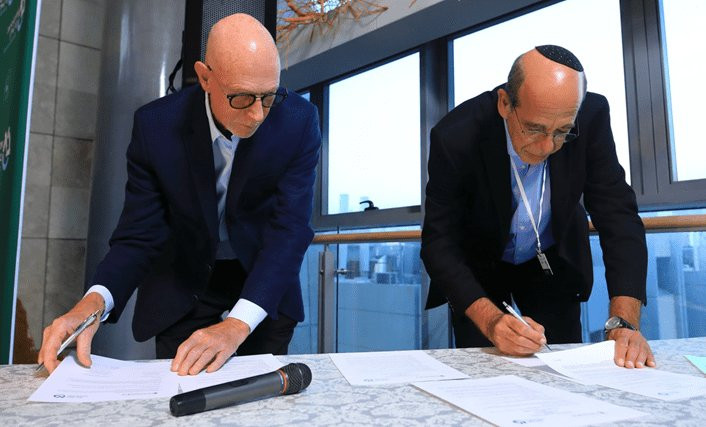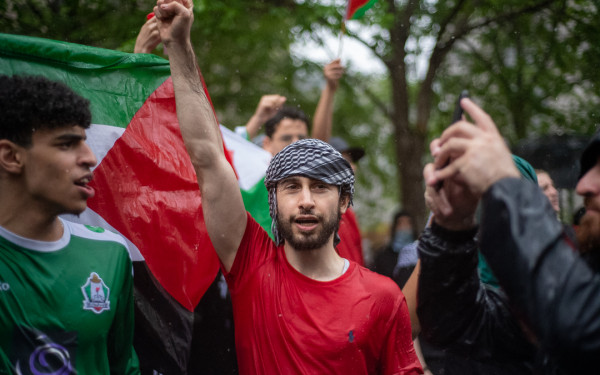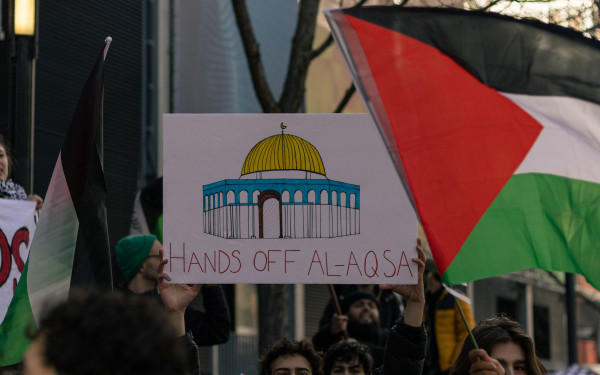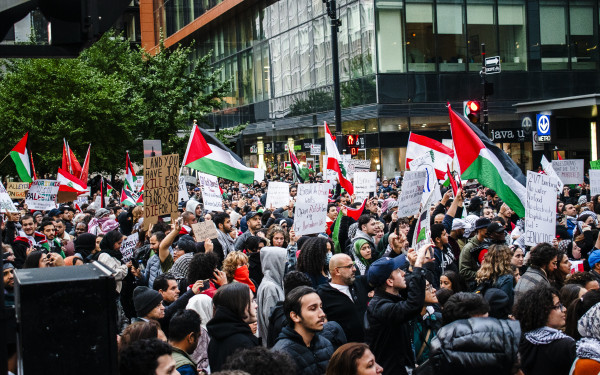Palestinian Students Denounce President’s Trip to Israel
Concordia-Funded Trip Angers Palestinian Community
Disclaimer: For the safety of the students, anonymity and pseudonyms were granted upon request.
When Palestinian Concordia student Nour found out how her university had been spending her tuition money, feelings of disappointment, hurt, disgust and disrespect overwhelmed her.
In August 2022, Concordia President Graham Carr participated in a trip to Israel to visit Bar-Ilan University in Tel Aviv and build academic connections.
Carr was one of 15 Canadian university leaders who took part in the trip organized by the Centre for Israeli and Jewish Affairs (CIJA), a Canada-wide pro-Israel political action group.
“It’s extremely hypocritical that the president went to occupied Palestine to build international connections when Israel is uprooting Palestinians and demolishing homes as we speak,” said Nour, who is a member of Solidarity for Palestinian Human Rights (SPHR) Concordia.
While Concordia told The Link the reason for the trip was to foster academic collaborations and create opportunities for students and researchers, members and allies of the Palestinian community have denounced the university’s participation.
On Nov. 28, 2022, SPHR released its official response to Carr’s Israel trip. “We fully and absolutely condemn our president’s visit to occupied Palestine and the resulting deal between Concordia University and this Zionist institution [Bar-Ilan] as this action directly violates Concordia’s alleged commitment to decolonization,” the statement read.
Since Carr’s travels, questions asked by SPHR Concordia regarding the trip have gone unanswered.
Jenin, a Concordia student and member of SPHR, expressed a similar reaction to Nour. After spending her summer in Palestine, she found out about Carr’s trip in August 2022 a few days after landing in Canada. “The first thing I felt when I heard about the trip was shock. I felt deceived,” she said.
When asked for Concordia’s official position on the Israel-Palestine conflict, Concordia spokesperson Vannina Maestracci told The Link that it wasn’t the university’s place to have positions in political topics, and instead that the university intends to “strengthen academic freedom everywhere.”
“I don’t think there’s anything academic about the apartheid, colonization and years of mass expulsion, of terror or killings. I’m not seeing any academia in it.” — Jenin
However, Jenin couldn’t agree less with the university’s response. “I don't think there's anything academic about the apartheid, colonization and years of mass expulsion, of terror or killings. I’m not seeing any academia in it,” she said. “I think it's quite the opposite. I don't think that we should be taking any example from Israel.”
Nour expressed similar concerns. No matter the circumstance, she saw no valid reasons to justify the trip. “I am not going to give [Graham Carr] the benefit of the doubt,” Nour continued.
The trip itself was organized by CIJA in collaboration with 15 Canadian universities. When contacted for more information, CIJA Director of Communications Nicole Amiel said the organization would not comment on the trip and denied The Link’s request for an interview.
Apart from a notice published in September 2022 about the trip on the university’s website, Concordia did not make an official or public announcement about the planned visit to Bar-Ilan University prior to the trip.
Beyond criticism from students, Palestinian-Canadian academics and allies have also called into question the reasoning behind Concordia’s collaboration in the CIJA-organized project. Although the university has defended its participation in the trip on the grounds of academic freedom, academics have highly disputed this argument.
On Feb. 2, a group of academics from universities in Quebec, Ontario and Alberta published an article in The Conversation in which they argued against the universities’ defences of the trip.
Among them was Jillian Rogin, assistant professor of law at the University of Windsor and member of Independent Jewish Voices (IJV) and the Jewish Faculty Network. Another author was Dyala Hamzah, associate professor of modern Arab history at Université de Montréal and member of the Palestinian-Canadian Academics and Artists Network (PCAAN).
Rogin and Hamzah sat down with The Link to discuss the consequences of Concordia’s and other universities’ participation in this trip to Israel.
“One of the most problematic parts of this trip is that it was led by CIJA,” Rogin said. “It is a political lobby group with no academic or scientific experience. Their mandate is solely political.”
“This means that Canadian presidents and administrators have made a loud and clear political statement in favour of the state of Israel and at the expense of Palestinian human rights,” she added.
“Canadian presidents and administrators have made a loud and clear political statement in favour of the state of Israel and at the expense of Palestinian human rights.” — Prof. Jillian Rogin
Rogin explained that CIJA claims to educate Canadians about Israel’s central role in Jewish life, a position she wholeheartedly disagrees with. “As a Jewish person, I don’t identify with Israel. I reject that idea—it’s not part of my identity.”
The group has multiple political priorities, Rogin said. One of them is to strengthen ties between Canada and Israel. Another is the redefinition of antisemitism in order to connect it with anti-Zionism, she continued.
According to Rogin, labelling legitimate criticisms of Israel as antisemitic encourages anti-Palestinian racism and damages academia. “The fact that university presidents went on a CIJA-sponsored trip is an indication that they have not reckoned with the severe impairments to academic freedom CIJA has sponsored,” she said.
For Hamzah, witnessing the ties between Canadian and Israeli universities is a sign of moral bankruptcy. She criticized the universities for legitimizing Israel through their academic partnerships.
“Israel needs allies left, right and centre. And what better allies are there than universities, given that their mandate is the pursuit of knowledge?” Hamzah said. “No other social institution can better vouch for you and provide a moral shield than universities—and CIJA knows this.”
Hamzah further discussed that partnering with Israeli institutions like Bar-Ilan University does not come without larger ramifications. “Israeli universities are unfortunately not beacons of emancipatory knowledge or bastions of critical resistance to injustice; they are part and parcel of the apparatus of oppression stifling Palestinians,” she said.
Rogin and Hamzah denounced Concordia’s use of academic freedom as a justification for the trip. They argued that Canadian universities’ disregard of Palestinian voices, which includes Palestinian academics, is itself a violation of academic freedom.
For months, pro-Palestinian advocates in Canadian academia have been mobilizing to make university administrations hear their message: centre Palestinian voices.
The Coalition for Palestine, a network including PCAAN, IJV, Faculty for Palestine Canada and Canadians for Justice and Peace in the Middle East, has called for a boycott of Israeli academic institutions.
“Israeli universities are unfortunately not beacons of emancipatory knowledge or bastions of critical resistance to injustice; they are part and parcel of the apparatus of oppression stifling Palestinians.” — Prof. Dyala Hamzah
“We sent a letter to the U15 presidents, but received very few answers. We then decided to turn it into a petition—we collected over 400 signatures,” Hamzah said. After learning about the trip, she confronted the president of UdeM, who told her he did not take part.
After further informing him about the weaponization of Israel's academic institutions against Palestinians, Hamzah ultimately submitted a resolution calling for the suspension of all UdeM’s agreements with Israeli universities.
“Of course, it was defeated,” she said, “but it had an effect.” Between the time she submitted the resolution and the time she was interviewed, Hamzah noticed UdeM had cleaned up its website; its inactive partnerships were taken down, leaving three up online.
“That’s still three too many,” she added. “We are now looking very closely into the agreements of every single Canadian university with Israeli universities.”
Additionally, Hamzah spoke about how multiple Israeli universities participate in military or defence research programs. According to Visualizing Palestine, a visual data tool founded in 2012, Bar-Ilan University has allegedly been involved in “work with the Israeli military to develop unmanned combat vehicles and heavy machinery used to commit war crimes like home demolitions.”
Concordia has denied knowing about Bar-Ilan’s alleged ties to the Israeli military.
The university also reached out to The Conversation following the publication of the piece Rogin and Hamzah were involved in, specifying a Concordia delegate visited Al-Quds University in Palestine, Hamzah added.
However, one of the primary purposes of Carr’s trip was to sign a memorandum of understanding with Bar-Ilan. The Link has obtained a copy of the MOU via an access to information request.
The MOU states that the universities have agreed to explore and implement initiatives focused on collaborative research, sharing of scientific information on areas of mutual interest, faculty mobility, summer programs for students and other academic collaborations.
“Neither institution shall have any financial commitments to each other,” the MOU reads. Concordia and Bar-Ilan have agreed to “endeavour to secure governmental, corporate, or other third party funding where possible.”
The MOU was signed on Aug. 28, 2022, and will remain in place until Aug. 28, 2024. In its Amendment and Termination clause, either party has the right to end the agreement at any time.
However, the partnership with Bar-Ilan is not Concordia’s only academic collaboration with an Israeli university. In a Board of Governors meeting on Feb. 16, Carr announced the university received a $1 million donation shared with Ben-Gurion University.
The donation was courtesy of Miriam Roland, a former member of Concordia’s Board of Governors and Honorary President and Chair of the Jewish Community Foundation of Montreal.
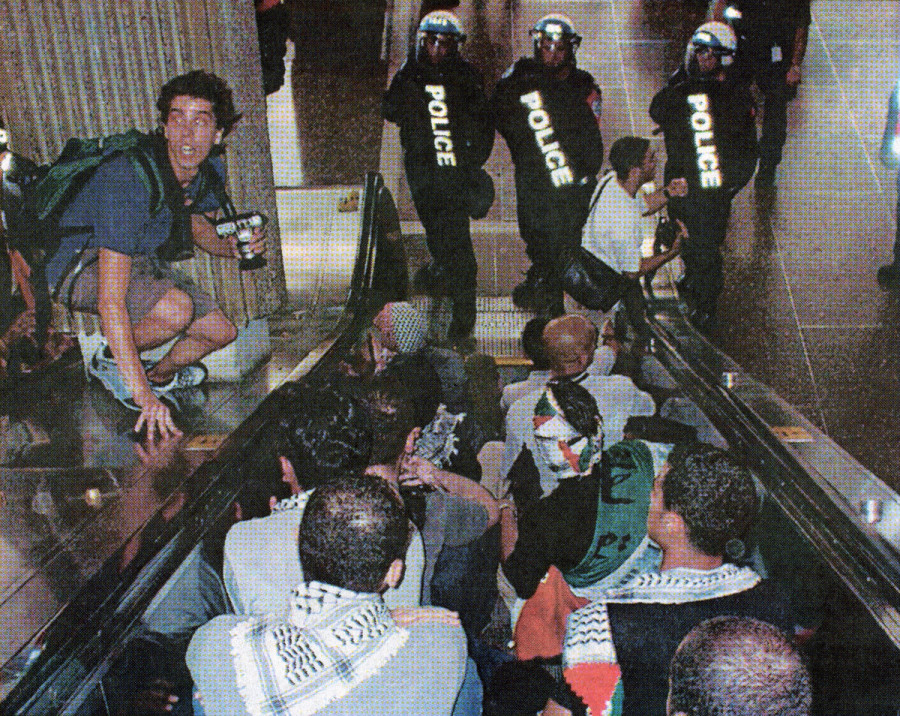
According to Concordia and BGU’s shared announcement, the money will be used to fund “sustainability pilot projects.”
Ben-Gurion has allegedly offered special benefits and scholarships to student-soldiers who participated in the 2014 military assault on the Gaza strip, according to Visualizing Palestine.
Although Concordia is furthering its relationships with Israeli universities, students and activists have refused to stand behind these decisions.
Pro-Palestine activism has been present on campus for decades, making the university’s affiliations with Israeli schools even more contentious.
Since Carr’s return, Palestinian Concordia students have continuously criticized him for his role in the trip. His return from Tel Aviv was a few weeks shy of the 20th anniversary of the Netanyahu Riot at Concordia.
On Sept. 9, 2002, Montreal riot police launched pepper spray into the Hall building after two windows on its ground floor were smashed.
Students were protesting a planned visit by then-former (and now current) Israeli Prime Minister Benjamin Netanyahu. His anti-Palestinian policies have been condemned by Human Rights Watch and Amnesty International, and he has also blamed Palestinians for the Holocaust. Netanyahu’s talk was cancelled following the 2002 demonstrations.
“The trip was not funded by CIJA. Concordia paid for it itself.” — Vannina Maestracci
When asked if the university was aware of the anniversary, Maestracci said the trip was not planned around Concordia, and that “these trips with a group of university presidents take place right before the start of the semester, when most of them are more available.”
Since being made aware of the trip, SPHR, Nour and Jenin had been under the impression that because CIJA had organized it, the group also paid for it.
However, The Link found that Concordia paid for its participation in the trip to Israel. “The trip was not funded by CIJA. Concordia paid for it itself,” said Maestracci.
The Link acquired more details about the trip via records provided by an access to information request.
In total, the university spent nearly $9,000 to send its president on the trip to Israel. The money was spent on business class flights, luxury hotels and several activities on the itinerary.
Carr left Montreal on Aug. 26, 2022, three days after his sit-down interview with The Link. He transferred to Toronto Pearson Airport and then took a direct flight to Tel Aviv. Sitting in a business class seat, Concordia spent $5,883 on airfare alone. That price doesn’t include the additional $75 for taxis to and from the airport. The president was also allowed a daily allowance of $52 while in Israel, which would come up to $364 for the week-long stay.
In addition, the university paid $2,500 to participate in the trip itself. The event was organized by the Centre for Israel and Jewish Affairs, which took care of the trip’s itinerary and its collective organization.
All 15 Canadian university presidents who attended the trip stayed at two five-star luxury hotels during their stay. Although the prices for the rooms were not listed in the document, Mamilla Hotel in Jerusalem currently charges $580 per night for a studio room, which is the least premium of those rooms available. Carlton Hotel charges $385 per room for a “Superior City View Room.” Carr stayed eight nights split between the two hotels.
During his week-long stay in Israel, the president visited seven Israeli and two Palestinian universities. On Sept. 1, 2022, Carr attended an “Israeli Politics 101” seminar and later in the day met with Israeli President Isaac Herzog. The itinerary also included several dinners, networking events, strolls around cities and leisurely activities like a “Lunch and Swim” at the Vert Hotel.
When Jenin learned about the funding behind the trip during her interview with The Link, all that could be heard was silence. “It’s crazy to think that the money I work for and use to pay for my tuition goes toward the apartheid,” she said.
Jenin continued to say that for Palestinian international students at Concordia, who have essentially been forced to become asylum seekers, knowing their money has gone towards a state that has tormented their community is beyond painful.
Nour claimed the university did not want to publicize the trip due to the backlash they would receive. “The student body at Concordia voted 86 per cent to pass a motion against apartheid,” she said. To her, that seemed to be one of many reasons Concordia remained quiet about the trip, knowing it would lead to a strong reaction from the student body.
“Palestinians in the diaspora are getting fed up,” Nour said. “If it continues down this road, if we continue to feel unheard, ignored, and disrespected, we won’t stay silent.”
This article originally appeared in Volume 43, Issue 12, published February 21, 2023.

